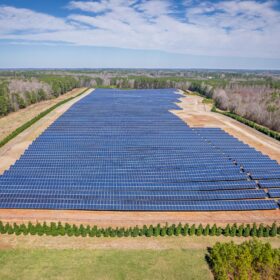La Niña Ridge drives December solar gains across U.S. Southwest
In a new weekly update for pv magazine, Solcast, a DNV company, reports that December’s solar resource reflected a classic La Niña pattern, with suppressed irradiance in the Pacific Northwest and above-normal conditions across the southern U.S. A blocking ridge brought clear skies and strong solar gains to the Southwest and Texas, while cloud cover and fog reduced output farther north.
How real estate financing can keep projects moving in 2026
Solar developers are leveraging land assets to bypass financing bottlenecks and secure critical safe-harbor status ahead of the 2026 deadline.
Case study: Energy storage EPC achieves 365+ days with no OSHA incidents
In an industry where risk is the status quo, TruGrid Power has beat expectations by delivering over 200,000 work hours and five major utility projects with a flawless 0.0 incident rate, proving that a total commitment to safety can turn the most dangerous jobsites into gold standards of operational excellence.
2026 National Electrical Code changes: PCS and EMS part 1
The 2026 National Electrical Code (NEC) introduces a significant shift in electrical design by prioritizing real-time power flow over traditional, often oversized, theoretical worst-case calculations. This evolution centers on the formal distinction between two critical technologies: Energy Management Systems (EMS) and Power Control Systems (PCS), which is explored in part one of this two-part series.
Early Solar forecast: First half 2026 solar irradiance outlook
In a new weekly update for pv magazine, Solcast, a DNV company, reports that early 2026 will bring mixed solar conditions globally, with strong prospects in eastern Australia and eastern China, but cloudier-than-normal outlooks for much of Europe, Asia, and parts of the US early in the year.
What happens when utilities raise the fixed charge and lower the energy charge?
Shifting utility costs from usage rates to fixed monthly fees may penalize efficiency and fail to provide the financial incentive necessary to drive widespread electrification.
Global solar generation topped 540 GW in April, says Solcast
In a new weekly update for pv magazine, Solcast, a DNV company, reports that the global peak of solar output in 2025 occurred on April 29, at 06:00 UTC, estimated at 539 GW.
Too much to choose from, too little to decide
Market pressure in the solar and storage sectors often favors low-cost solutions, but long-term success depends on balancing price, quality, and reliability for assets designed to operate for decades. Numerous examples, from low-grade silicon modules to residential hydrogen and redox flow storage, show how technically ambitious products can fail when costs, complexity, or durability are misjudged.
Demand diligence from U.S. battery integration
Tariffs continue to reshape the U.S. storage market. Rising costs for overseas systems have created new incentives to integrate equipment domestically, and many developers are turning to US firms to assemble battery systems. Integration capacity can scale faster than battery cell manufacturing, but not without risk. Unlike cell plants, where automated processes keep variations in check, battery assembly and integration depends on people, as Jeff Zwijack from Intertek CEA explains.
The journey of urban microgrids: From backup to backbone of city resilience
Integrating microgrids through advanced management systems transforms isolated backup power into a dynamic, interconnected foundation for urban grid resilience and stability.















